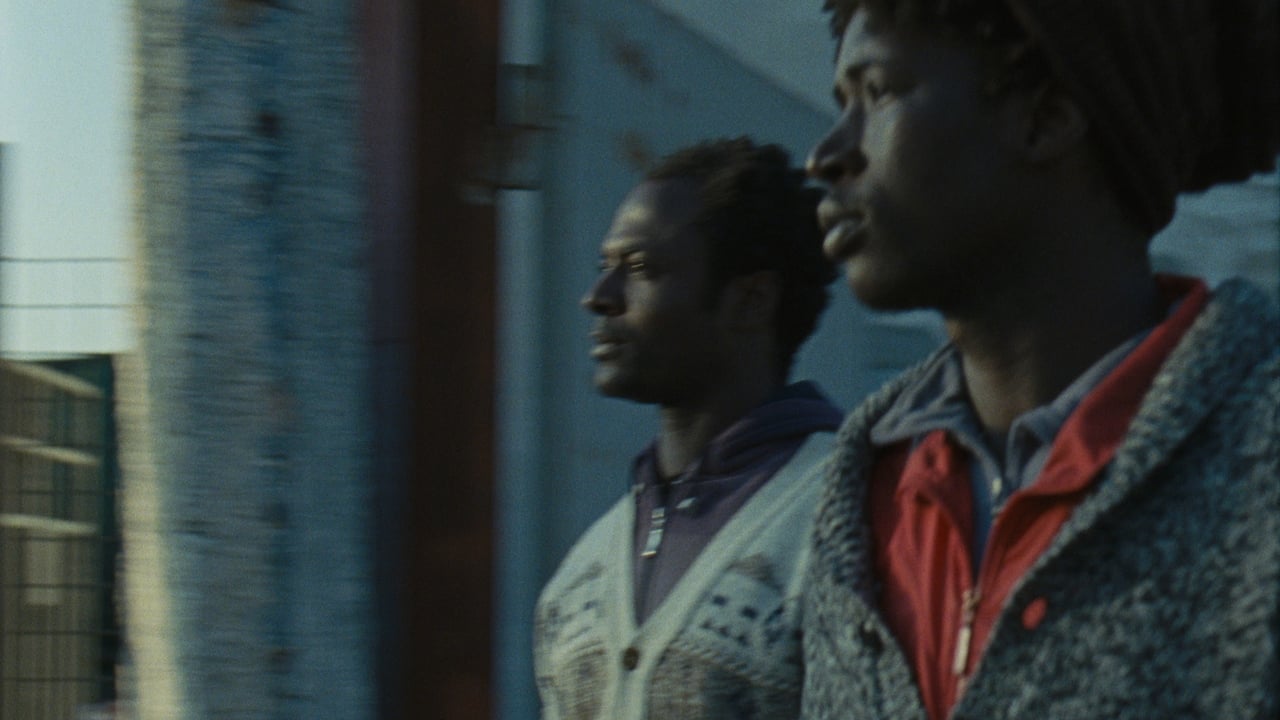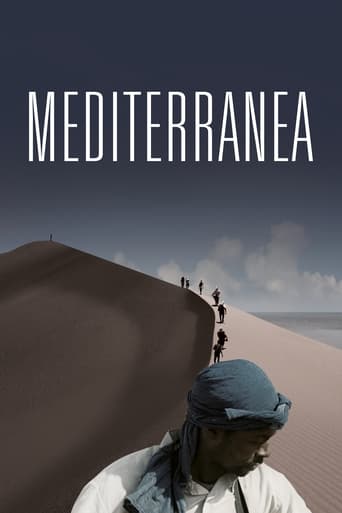

"Mediterranea" (2015 release from Italy; 110 min.) brings the story of Aviya and Abas, two guys from Burkina Faso (in central Africa). As the movie opens, we see them starting the long journey towards Tripoli (2700 mi. away), by truck and by foot, through deserts and towns. At one point, the group of about 20 is ambushed by 'desert pirates', and by the time they are to depart from Tripoli, they have nothing left but the shirts on their backs, literally. After a dangerous trek across the Mediterranean See in a Zodiac boat, they arrive in Italy, and hook up with an acquaintance already living in Rosarno, in southern Italy (just past Sicily). What will become of these guys? How will they be treated by the locals? To tell you more would spoil your viewing experience, you'll just have to see for yourself how it all plays out.Couple of comments: this is the debut film of writer-director Jonas Carpignano, and what a movie this is! I cannot claim to know whether what we see here is realistic, although it certainly resembles the images that we have seen (time and again) on TV of the many migrants from Africa, in a desperate quest to make it to Europe. This movie premiered at Cannes 2015, so this was probably filmed in the Fall of 2014, if not earlier. In other words; before the trickle of migrants became a wave until it became a tidal wave. What I'm getting at is that what we see here, as tough as it is, probably was the "good era" before European countries felt besieged. It's also noteworthy that we are not given any information as to why these guys are fleeing their home country: is a civil war going on? or are they simply tired of their economic condition and want to build a better life in Europe? The director does a great job giving us the nuances of what it is like for a small town in Italy to be confronted with these uninvited migrants from Africa. I was not familiar with any of the lead performers, but the actor portraying Ayiva is nothing short of outstanding. Bottom line: this may be uncomfortable viewing for some, but, even putting aside the humanitarian aspects of these issues, I thought this movie was excellent.As mentioned, this premiered two years ago, to critical acclaim. It never made it to the theater here, but by happenstance it played last week for one screening only at my local art-house theater here in Cincinnati. That screening, presented by the University of Cincinnati's "European Film Series", was attended very nicely, I'm happy to say. "Mediterranea" is HIGHLY RECOMMENDED!
... View MoreStark realism in this intense drama of the perilous journey of 2 men emigrating from their home in Burkina Faso to Libya, and ending up in Italy, as they seek better opportunities. The men ably portrayed by Kondous Seihon,as Ayiya, and Alassane Sy, as Abas, will have to survive an initial hazardous trek across the desert, that will also include facing murderous bandits, difficult weather, and a dangerous sea crossing, before being picked up by the Italian Navy. Given 3 month temporary papers to stay in Italy, Ayiya and Abas must now face squalid living conditions, low-paying seasonal jobs, and a mostly hostile public and police force. However, they'll also encounter a tight knit African immigrant community who try and help each other, and a number of local Italians who will also try to help them. Considering the news of today, this film is certainly timely in its nature.All in all, regardless of what side of the immigrant issue one is on, you may find this movie, impressively written and directed by first time filmmaker Jonas Carpignano, offers the viewer a vivid and realistic view of it all.
... View MoreI knew nothing about this film when I sat down to it as part of a project to choose films for distribution in the Czech Republic. I took to it fast. The hand-held camera takes some getting used to, and there were times when the action was unclear due to a lack of light. The style was appropriate for the most part, however, suiting the subject and setting. The main characters are sympathetic and their stories comprehensible from the start. The brothers Ayiva and Abas we travel with from a few minutes into the film, are believably differentiated throughout. I personally understood Ayiva, whose POV the film takes, and who seemed to take a rope-a-dope stance to anything the world could throw at him, but could understand why his brother might look down on him for it.The film is gentle. Never preachy. The acting is natural. I have come across references to the main characters having been played by non-actors, with Ayiva played by a refugee whose story resembles his character's. True or not, it feels real enough. For most of the film, the story of the refugees life here stands in relation to many other similarly-themed films as Jarhead stands to other war films: though there is action, it's low key, with much of it relating to work, to getting hands on a bargain, Skypeing home, the rituals of food. In the last third of the film, this changes somewhat, but if the pace steps up, it is never long frenetic.In 2015, this is an important film that deserves some real success.
... View MoreMEDITERRANEA written and directed by Jonas Carpignano who has been working on this film for 5 years. Initially in 2010, he intended the project to be a short documentary on the African immigrants who were mainly farm workers in the town of Rosarno in Calbria, Italy protesting against their discriminatory treatment and horrific squalid living conditions." several thousand immigrants live in and around Rosarno while helping with the harvest of oranges and clementines On the Gioia Tauro plain which encompasses Rosarno, they are collected each morning by overseers and driven into citrus groves for work that can last from dawn to dusk "They earn 25 a day", said Father Ennio Stamile of the Roman Catholic charity Caritas. 'They have to send money to their countries to maintain their families and also live here. Not much is left for them. The economic crisis has exacerbated their situation On the plain, there are about 2,000 African immigrants who sleep the night crowded together in a former paper mill and another large building, said Monsignor Pino de Masi, the vicar-general of the Oppido-Palmi diocese. 'If anyone from central government were to see the conditions in which they live, without sanitation, electricity, water or heating, they would not be surprised by what has happened.' " (The Guardian, John Hooper 1/2/2010) Nights of violence between the migrants and the Italian locals led to many injuries and during the day demonstrators - marched on Town Hall to demand an end to racial intolerance. Into this highly-charged milieu, the Director Carpignano met an Aftrican migrant, Koudous Seihon from Burkina Faso whose powerful presence changed the trajectory of his original concept - from a short documentary to a full-length feature film based on the life and stories told to him by Seihon who also agreed to play the lead character, Ayiva - a beautiful, nuanced performance conveying steadiness of character with a deep longing for his homeland and the seven year old daughter he left behind, combined with an optimistic view of a future that is fraught with barriers based on color, and economic bleakness.MEDITERRANEA follows the well worn path to "the promised land" which unknowingly is often seeded with hopelessness and despair. In this fictional dramatization of Koudous Seihon's own trek, Ayiva must first obtain the money to leave Burkina Faso and is forced to pay unscrupulous brokers high fees to get a seat on a truck filled with fellow travelers - herded together like lambs going to slaughter. I am an artist whose focus has been on refugees and migrants for the past 14 years and the images on the screen reflected my paintings like a mirror - literally pictures moving. I wanted to cry out "hold that frame, and the next one, and the one after, etc. etc!!!!" Once on their journey to Europe the exhausted bands of wanderers have to go through many difficult and life threatening trials - all on foot - over Algiers; stumbling through the dry vast seemingly limitless Libyan desert, where bandits/ human vultures prey on the vulnerable; and the final "labor" - maneuvering a small boat without a seasoned navigator through the volatile waters of the Mediterranean Sea exposed to nature's moods - be they light-filled or threatening storms - until those that endure arrive in Calabria - the toe of Italy where the local welcome is wary and impassive and often downright aggressive and dangerous.Wyatt Garfield's cinematography is immediate and intimate. The hand-held camera bounces along with the fleeing characters contributing to the chaotic climate and the confusion of flight - we don't know where we are; there are moments when the lens is in and out of focus, an arm, a leg an eye bounces on the screen, distance is compressed - near and far become a blur, and we in the audience experience the tension and agitation of the approaching unknown.We follow Ayiva and his best friend Abas (Alassane Sy), a languid, narcissistic, spoiled man envisioning Europe as a huge Hollywood fantasy with a dream of sexy women responding to his "handsome charms" - who smashes up against reality filling him with anguish at the fetid and wretched circumstances he and his friend are forced to occupy, falling into depression and despondency, eventually striking back in frenzied frustration. MEDITERRANEA is not delusional cinema - it is a heard-hitting view of displacement, contrasting cultures with moments of shared humanity. The flight from the homeland - is a painfully difficult one which requires a steeliness of will and some humor. That humor is injected by a teenaged Italian boy Pio (Pio Amato), a consummate tradesman who barters with the African immigrants and is a dead-panned comic. In contrast the immigrant women are often exploited by theItalian men, and we catch a glimpse of how they are sexually abused -barely witnessed by the camera, silhouettes in the act of fellatiobehind a dim, closing door. The film climaxes with the immigrants' fierce uprising on the streets of the city after the destruction and collapse of their tawdry makeshift "homes" - demolished by the Italian Police - Carabinieri. The locales in the community are brutal in their response - a retelling of the original Rosarno outbreak, where Director Jonas Carpignano first met Seihon (Ayiva) who would galvanize this movie; an attempt to narrate crossing borders without any simple answers to what we see daily in the "headlines".
... View More